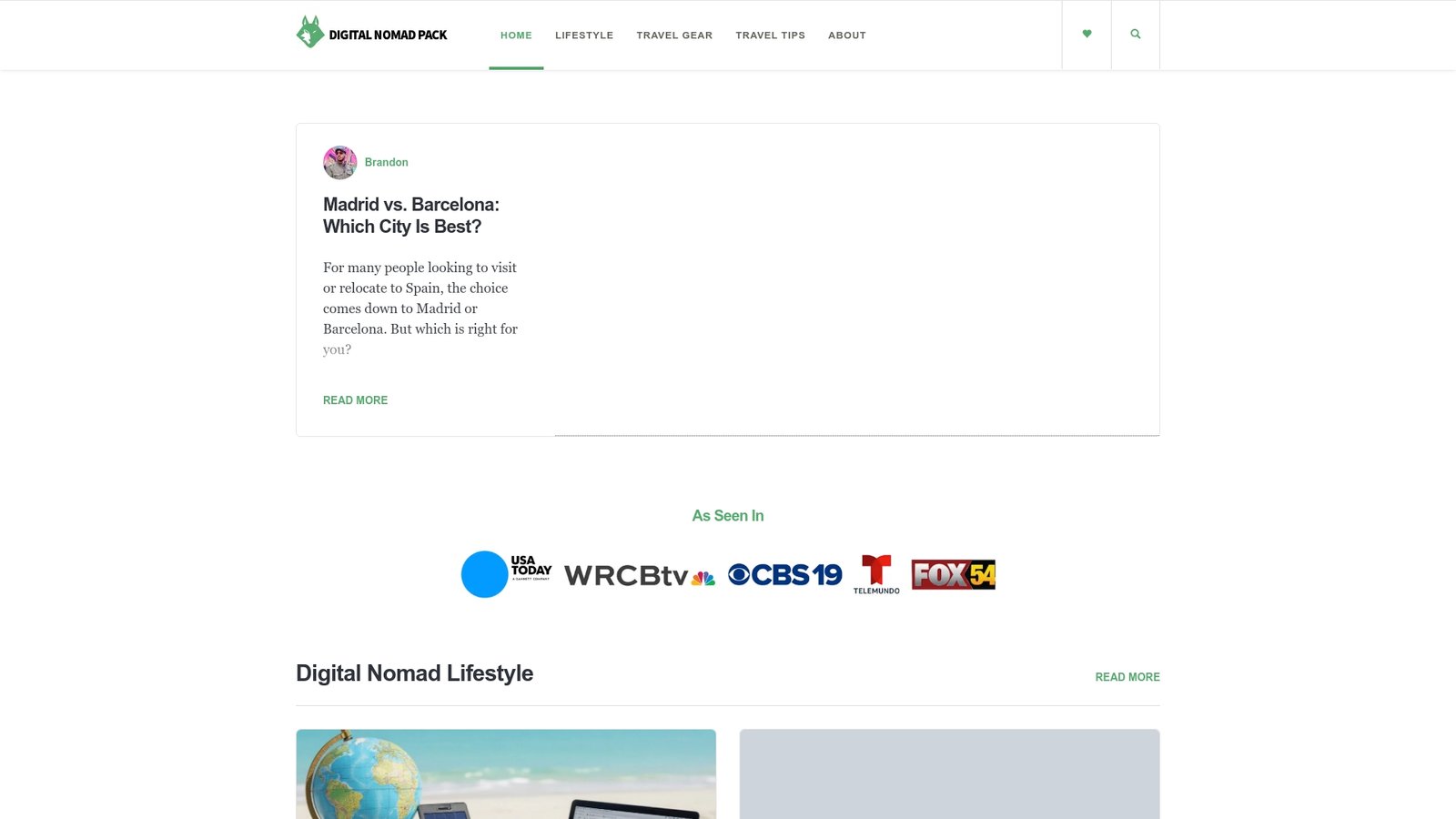Digital Nomad Definition: What It Means and How It Works
People have started trading cubicles for backpacks and turning any café with Wi-Fi into an office. Over 35 million people worldwide now call themselves digital nomads, a number that has more than doubled since 2019. That sounds like a dream of constant adventure and freedom, right? Surprisingly, the digital nomad life is not just about travel and endless sunsets. What sets it apart is how discipline, planning, and adaptability end up mattering more than the ability to work from the beach.
Quick Summary
| Takeaway | Explanation |
|---|---|
| Digital nomads leverage technology for work and travel. | They work remotely while traveling, using digital tools for productivity. |
| Multiple income streams are vital for stability. | Diverse income sources help manage financial uncertainty and sustain the lifestyle. |
| Self-discipline is crucial for success. | Managing time and productivity independently is essential when not in a traditional office. |
| Initial planning and skill development are necessary. | Prospective nomads should assess their skills and strategically prepare for remote work opportunities. |
| Adaptability is essential for navigating challenges. | Digital nomads need to be flexible to thrive in various environments and overcome issues like isolation. |
Digital Nomad Definition Explained Simply
The digital nomad lifestyle represents a revolutionary approach to work and travel that has emerged in the digital age. At its core, a digital nomad is someone who leverages technology to work remotely while maintaining a location-independent lifestyle. Merriam-Webster defines this modern professional as someone who performs their entire occupation over the Internet while traveling.
What Exactly Makes Someone a Digital Nomad
Unlike traditional workers confined to a single office or location, digital nomads break free from geographical constraints. They use digital technologies to earn a living, typically working as freelancers, remote employees, entrepreneurs, or online service providers. According to research from the National Center for Biotechnology Information, these professionals are not just travelers but adaptable individuals who must continuously adjust to various work environments and cultural contexts.
The defining characteristics of a digital nomad go beyond simple travel. These professionals require a unique combination of skills: technological proficiency, self-discipline, adaptability, and the ability to create a productive workspace anywhere in the world. Their work setup typically involves a reliable laptop, robust internet connection, and a range of digital tools that enable seamless communication and project management.
The Core Components of Digital Nomad Living
Successful digital nomads typically rely on several key components to sustain their lifestyle. Income sources must be entirely online and location independent. This could include freelance writing, web development, digital marketing, online consulting, or running an e-commerce business. Our guide on digital nomad lifestyles explores the nuanced strategies professionals use to maintain financial stability while traveling.
Technology serves as the backbone of the digital nomad experience. Cloud storage, video conferencing tools, project management platforms, and secure communication apps enable these professionals to work effectively from cafes in Bangkok, co-working spaces in Lisbon, or beach retreats in Bali. The ability to seamlessly transition between work and travel requires not just technological skills but also a mindset of continuous learning and flexibility.
Moreover, the digital nomad lifestyle is not just about work freedom but also about personal growth. By constantly exposing themselves to new cultures, environments, and challenges, these professionals develop unique perspectives and skills that traditional office workers rarely experience. They become global citizens, breaking down geographical barriers and redefining what it means to have a career in the 21st century.
While the lifestyle might seem glamorous, it demands significant personal discipline, strategic planning, and an entrepreneurial spirit. Digital nomads must manage multiple complex aspects simultaneously: maintaining client relationships, ensuring consistent income, handling international taxes, managing health insurance, and navigating visa requirements across different countries.
Ultimately, the digital nomad definition extends far beyond a simple working arrangement. It represents a profound reimagining of work, life, and personal freedom in an increasingly connected global landscape.
Types of Digital Nomad Lifestyles
Digital nomadism is not a one-size-fits-all lifestyle but a diverse spectrum of professional and personal approaches to location-independent work. Research from Springer highlights the complexity of digital nomad lifestyles, emphasizing that these professionals can be categorized based on their work relationships, travel patterns, and personal motivations.
Freelance Digital Nomads
Freelance digital nomads represent the most traditional and flexible category of remote workers. These professionals typically work independently, offering services such as writing, graphic design, programming, digital marketing, or consulting. According to research from the National Center for Biotechnology Information, they often move between different jobs and positions to sustain their mobile lifestyle. Their income streams are diverse and project-based, allowing them maximum geographical freedom.
Freelancers require exceptional self-management skills. They must simultaneously handle client acquisition, project delivery, financial management, and travel logistics. This category of digital nomads often utilizes platforms like Upwork, Fiverr, and freelance networks to secure international work opportunities.
Remote Employee Digital Nomads
Remote employee digital nomads work full-time for a single organization while maintaining the flexibility to work from anywhere in the world. Unlike freelancers, they have a more stable income and structured work environment. Our guide on digital nomad lifestyles explores how these professionals navigate corporate policies and international work arrangements.
These digital nomads often work in technology, customer support, project management, design, and other roles that can be performed entirely online. Companies increasingly recognize the benefits of hiring remote talent, offering flexible work arrangements that support this lifestyle. Remote employees typically require strong communication skills, time management abilities, and technological proficiency to succeed in this model.
Entrepreneurial Digital Nomads
Entrepreneurial digital nomads stand out as the most innovative category. They build and manage online businesses that can operate independently of physical location. This might include e-commerce stores, digital product creators, online course developers, affiliate marketers, or startup founders leveraging digital platforms.
Their business models are designed with location independence in mind. They use automation tools, virtual teams, cloud-based technologies, and global payment systems to manage operations from anywhere. Unlike other digital nomad categories, entrepreneurial nomads are not just working remotely but actively creating scalable business models that generate passive or semi-passive income.
Each digital nomad lifestyle comes with unique challenges and opportunities. While freelancers enjoy maximum flexibility, remote employees benefit from stability. Entrepreneurs potentially have the highest income potential but also face more significant business risks. What unites these categories is a shared commitment to reimagining work beyond traditional geographical constraints.
Here’s a comparison table summarizing the three main types of digital nomad lifestyles described in the article, highlighting their defining features, benefits, and primary challenges for easy reference.
| Type of Digital Nomad | Key Features | Main Benefits | Primary Challenges |
|---|---|---|---|
| Freelance Digital Nomads | Work independently on projects; diverse clients | Maximum flexibility | Income instability, self-management |
| Remote Employee Digital Nomads | Full-time with one employer; structured work | Stable income, job security | Navigating company policies, time zones |
| Entrepreneurial Digital Nomads | Build/manage online businesses; scalable models | Highest income potential | Business risks, operational complexity |
The digital nomad lifestyle is not just about traveling or working remotely. It represents a profound shift in understanding work, personal freedom, and global connectivity. As technology continues to evolve, we can expect these lifestyle categories to become increasingly nuanced and interconnected.
Benefits and Challenges of Being a Digital Nomad
The digital nomad lifestyle presents a complex landscape of extraordinary opportunities and significant challenges. Encyclopedia Britannica highlights that this lifestyle is far from a simple vacation, requiring careful navigation of professional and personal dynamics.
Professional Freedom and Personal Growth
Digital nomads experience unprecedented professional flexibility. They can design work environments that maximize productivity and personal satisfaction. Unlike traditional professionals confined to static office spaces, these individuals create customized work experiences that adapt to their individual needs and preferences.
The ability to work from diverse global locations allows digital nomads to expand their professional networks exponentially. By interacting with professionals from different cultural backgrounds, they develop unique cross-cultural communication skills and global perspectives. Our guide on digital nomad transitions explores how these experiences can transform career trajectories.
Geographical arbitrage becomes a significant advantage. Digital nomads can strategically choose locations with lower living costs while maintaining high-income potential. This approach allows them to optimize their earnings and lifestyle simultaneously, a strategy not available to traditional workers.
Financial and Security Considerations
Financial management represents a critical challenge for digital nomads. According to research examining remote working risks, these professionals face unique financial uncertainties. Income streams can be unpredictable, and managing international taxes, health insurance, and retirement planning requires sophisticated financial literacy.
Security presents another complex dimension. Digital nomads must constantly protect their technological infrastructure while working in potentially unsecured environments. This includes managing cybersecurity risks, ensuring reliable internet connections, and protecting sensitive professional data across different international contexts.

Psychological and Lifestyle Challenges
While the lifestyle appears glamorous, digital nomads frequently encounter significant psychological challenges. Constant travel can lead to feelings of isolation, disrupted social connections, and potential burnout. The lack of a consistent physical community means these professionals must intentionally build and maintain social networks.
Mental health becomes paramount. The excitement of travel must be balanced with structured work routines, personal wellness practices, and emotional stability. Digital nomads often report experiencing both extraordinary freedom and unexpected emotional complexity.
The lifestyle demands exceptional self-discipline. Without traditional workplace structures, digital nomads must independently manage time, maintain productivity, and create personal accountability mechanisms. They become their own managers, motivators, and performance evaluators.

Ultimately, being a digital nomad is not about escaping work but reimagining how work integrates with personal growth, travel, and global experiences. It requires a unique blend of professional skills, emotional intelligence, and adventurous spirit. The path is neither universally ideal nor universally challenging but deeply personal and transformative for those who successfully navigate its complexities.
How to Start Your Digital Nomad Journey
Transitioning into the digital nomad lifestyle requires strategic planning, self-assessment, and a deliberate approach to professional transformation. The U.S. Government Accountability Office emphasizes the importance of understanding technological and regulatory frameworks before embarking on this unique career path.
Skill Development and Professional Preparation
Successful digital nomads begin by identifying and developing marketable remote skills. This involves conducting a comprehensive personal skills audit, understanding current market demands, and strategically upskilling in digital domains. Potential digital nomads should focus on building expertise in areas like web development, digital marketing, content creation, online consulting, graphic design, or programming.
Online learning platforms provide accessible pathways for skill acquisition. Courses on platforms like Coursera, Udemy, and LinkedIn Learning offer targeted training in remote-friendly professional skills. The goal is not just learning technical abilities but developing a versatile skill set that can be applied across multiple digital work environments.
Building a robust digital portfolio becomes crucial. This means creating an online presence that showcases professional capabilities, demonstrates past project successes, and attracts potential remote clients or employers. Our comprehensive guide to digital nomad transitions provides detailed strategies for creating a compelling professional digital footprint.
Financial and Logistical Planning
Financial preparation is fundamental to a successful digital nomad journey. This involves creating multiple income streams, establishing an emergency fund, and developing a sustainable financial strategy. Digital nomads must plan for variable income, international taxation complexities, and potential periods of reduced earnings.
Practical logistics require careful consideration. This includes selecting appropriate digital tools, ensuring reliable technological infrastructure, and understanding international visa regulations. Potential digital nomads should invest in high-quality, portable technology, secure cloud storage solutions, and robust cybersecurity measures.
Healthcare and insurance represent critical planning components. Digital nomads need comprehensive international health coverage that provides protection across multiple countries. This might involve specialized digital nomad insurance plans that offer flexibility and global coverage.
Initial Transition and Lifestyle Adaptation
The initial transition into digital nomadism often requires a measured approach. Many professionals begin by negotiating remote work arrangements with current employers or transitioning gradually from full-time employment to freelance or contract work. This strategy provides a safety net while developing the necessary skills and professional network.
Choosing initial destinations becomes a strategic decision. Digital nomads should research locations with reliable internet infrastructure, affordable living costs, and welcoming remote work environments. Community matters significantly, so connecting with existing digital nomad networks can provide invaluable support and practical advice.
Mental preparation is equally important. The digital nomad lifestyle demands exceptional adaptability, self-discipline, and emotional resilience. Prospective digital nomads should develop strong personal management skills, create structured daily routines, and cultivate a mindset of continuous learning and flexibility.
Starting a digital nomad journey is not about making an overnight transformation but implementing a deliberate, strategic progression. It requires patience, persistent skill development, and a willingness to embrace uncertainty. Success comes from careful planning, continuous learning, and maintaining a balance between professional ambition and personal growth.
The following table breaks down the essential steps to start your digital nomad journey, as discussed in the article. This overview organizes each major stage with the core focus for better planning and preparation.
| Step | Main Focus |
|---|---|
| Skill Development & Professional Prep | Build marketable remote skills and digital portfolio |
| Financial Planning | Create multiple income streams, manage finances |
| Logistical Preparation | Obtain technology, research visas, secure health insurance |
| Gradual Transition | Negotiate remote work or start freelancing |
| Destination Selection | Choose locations with good infrastructure and community |
| Mental Preparation & Adaptation | Develop resilience, routines, and flexibility |
Frequently Asked Questions
What is a digital nomad?
A digital nomad is a person who uses technology to work remotely while traveling, maintaining a location-independent lifestyle. They usually earn a living through freelance work, remote employment, or running online businesses.
What skills are essential to become a successful digital nomad?
Key skills for digital nomads include technological proficiency, self-discipline, adaptability, and the ability to create a productive workspace in various environments. Specialized skills in areas like web development, digital marketing, or content creation are also beneficial.
What are the main challenges faced by digital nomads?
Digital nomads often encounter challenges such as financial instability, managing multiple income sources, navigating complex tax situations, and addressing feelings of isolation or burnout due to constant travel.
How can someone start their journey as a digital nomad?
To start a digital nomad journey, individuals should focus on skill development for remote work, create a financial plan with multiple income streams, prepare for logistical considerations such as technology and health insurance, and gradually transition from traditional employment to a remote lifestyle.
Ready to Transform Your Digital Nomad Experience?
Navigating the digital nomad lifestyle means more than working from new locations or enjoying flexible hours. It is about facing real challenges like maintaining steady income streams, building essential skills, and managing the realities of remote work as described in our article. Feeling overwhelmed or unsure where to start? The good news is you do not have to figure it out alone. Our Digital Nomad Lifestyle resource hub gives you practical tips, gear reviews, and destination guides tailored to help you overcome the unpredictability and isolation that many location-independent workers face.

Do not let uncertainty put your dreams on hold. Visit DigitalNomadPack.com now to access expert advice, in-depth reviews, and real-world solutions. Take your first step toward a more confident and sustainable nomadic journey today.


Comments
Leave a Comment